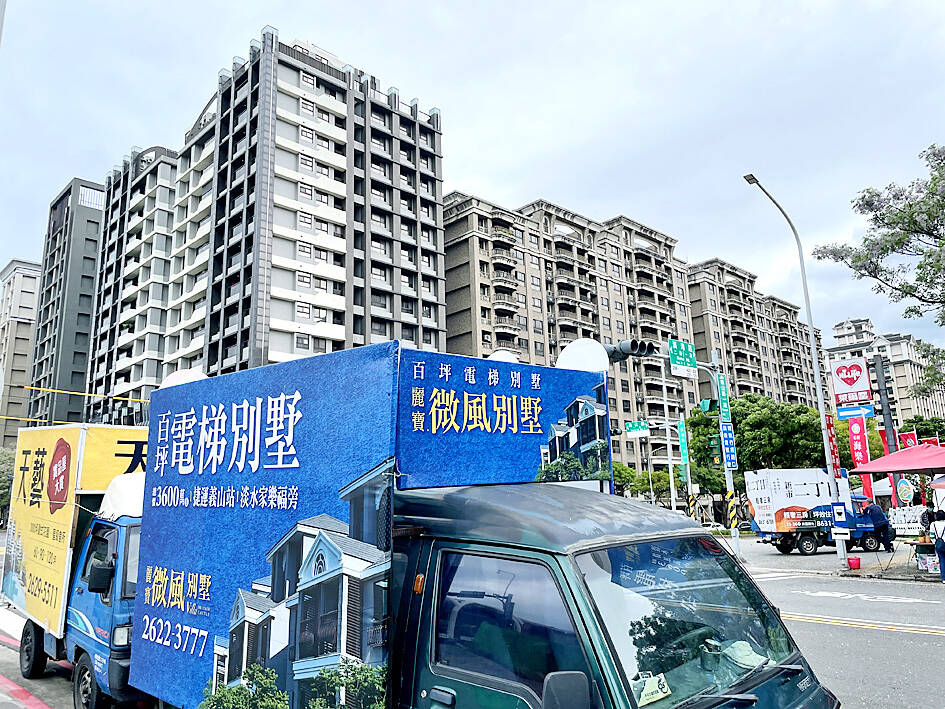A large majority of Taiwanese think that it is best to wait until economic uncertainty settles before entering the housing market, a survey by Evertrust Rehouse Co (永慶房屋) said late last month.
In response, the real-estate broker trimmed its forecast for housing transactions to between 315,000 and 326,000 units this year, suggesting a decline of 6 to 10 percent from an estimate three months earlier.
The downward revision came after the number of people expecting a rise in house prices dropped to 38 percent this quarter, the lowest in nearly 2.5 years, while people expecting prices to decline climbed to 31 percent, the survey said.

Photo: Hsu Yi-ping, Taipei Times
The sentiment is credited to global inflation and monetary tightening, as 73 percent of the respondents expected the central bank to raise interest rates again in December, and 79 percent said interest rates of more than 2 percent were burdensome.
Rising house prices and higher mortgage rates prompted only 16 percent of the respondents to conclude that this year is a good time to join the market, whereas more than 80 percent thought that next year or 2024 would be a better time to buy a home.
Some people have abandoned plans to buy homes as a result of absorbing higher costs for food, clothing, transportation and other services, Evertrust said.
Interest rates could reach 2.2 percent later this year, the highest since 2008 ahead of the global financial crisis, it said.
Continued infections from COVID-19, interest rate hikes and a slowing local economy are expected to dampen purchase interests this year, it added.
Housing prices rose throughout Taiwan, with the advance most noticeable in Tainan as a result of Taiwan Semiconductor Manufacturing Co’s (台積電) capacity expansion, Evertrust said.

UNCERTAINTY: Innolux activated a stringent supply chain management mechanism, as it did during the COVID-19 pandemic, to ensure optimal inventory levels for customers Flat-panel display makers AUO Corp (友達) and Innolux Corp (群創) yesterday said that about 12 to 20 percent of their display business is at risk of potential US tariffs and that they would relocate production or shipment destinations to mitigate the levies’ effects. US tariffs would have a direct impact of US$200 million on AUO’s revenue, company chairman Paul Peng (彭雙浪) told reporters on the sidelines of the Touch Taiwan trade show in Taipei yesterday. That would make up about 12 percent of the company’s overall revenue. To cope with the tariff uncertainty, AUO plans to allocate its production to manufacturing facilities in

TAKING STOCK: A Taiwanese cookware firm in Vietnam urged customers to assess inventory or place orders early so shipments can reach the US while tariffs are paused Taiwanese businesses in Vietnam are exploring alternatives after the White House imposed a 46 percent import duty on Vietnamese goods, following US President Donald Trump’s announcement of “reciprocal” tariffs on the US’ trading partners. Lo Shih-liang (羅世良), chairman of Brico Industry Co (裕茂工業), a Taiwanese company that manufactures cast iron cookware and stove components in Vietnam, said that more than 40 percent of his business was tied to the US market, describing the constant US policy shifts as an emotional roller coaster. “I work during the day and stay up all night watching the news. I’ve been following US news until 3am

COLLABORATION: Given Taiwan’s key position in global supply chains, the US firm is discussing strategies with local partners and clients to deal with global uncertainties Advanced Micro Devices Inc (AMD) yesterday said it is meeting with local ecosystem partners, including Taiwan Semiconductor Manufacturing Co (TSMC, 台積電), to discuss strategies, including long-term manufacturing, to navigate uncertainties such as US tariffs, as Taiwan occupies an important position in global supply chains. AMD chief executive officer Lisa Su (蘇姿丰) told reporters that Taiwan is an important part of the chip designer’s ecosystem and she is discussing with partners and customers in Taiwan to forge strong collaborations on different areas during this critical period. AMD has just become the first artificial-intelligence (AI) server chip customer of TSMC to utilize its advanced

Six years ago, LVMH’s billionaire CEO Bernard Arnault and US President Donald Trump cut the blue ribbon on a factory in rural Texas that would make designer handbags for Louis Vuitton, one of the world’s best-known luxury brands. However, since the high-profile opening, the factory has faced a host of problems limiting production, 11 former Louis Vuitton employees said. The site has consistently ranked among the worst-performing for Louis Vuitton globally, “significantly” underperforming other facilities, said three former Louis Vuitton workers and a senior industry source, who cited internal rankings shared with staff. The plant’s problems — which have not